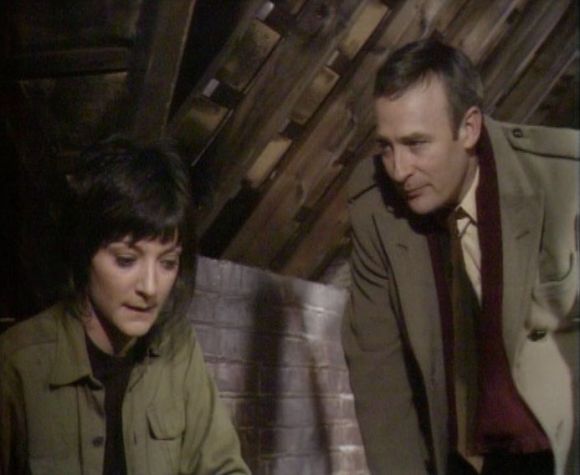
Professional gambler Maurice Michaelson (Anthony Valentine) has organised a group of ordinary punters who, under his instructions, intend to make a killing at the roulette table. Unfortunately for Maurice, casino boss Parsons (Leslie Schofield) is keeping tabs on him, which makes it essential he protects his team from Parsons’ intimidating ways.
Ever the good Samaritan, Arthur suggests that Terry’s flat would be the ideal place to keep them safe, although Terry – who had planned to spend some quality time alone with Penny (Ginnie Nevinson) – needs a little convincing ….
Following on from his S1 appearance in Aces High and Sometimes Very Low, Anthony Valentine makes a welcome return as Maurice (although sadly this would be the last we’d see of him).
Maurice has assembled together a mixed group of individuals who include the lovely Beth Morris as Jackie, the imposing Peggy Thorpe-Bates (probably best known as the long-suffering “She” – wife to Leo McKern’s Horace Rumpole) as Mrs Beecham and Ronald Leigh-Hunt (a very familiar television face) as Major Lampson. And after appearing, uncredited, in Gunfight at the O.K. Laundrette, Lynda Baron has a more substantial role – here she plays Sadie, a friend of Maurice’s long-suffering wife Maureen (Lesley Joseph).
Penny’s disdain for Arthur, and his manipulation of Terry, is made plain. She tells Terry that “you never make any plans, you just drift around letting that Arthur con you out of your hard-earned wages”. And when Arthur calls round to Terry’s flat, her antipathy is even more pronounced. After she angrily tells Arthur that he needs Terry more than Terry needs him, Arthur responds derisively (George Cole on great form here).
Terry is adamant that he’s not interested in Arthur’s latest minding job, but it would be a rather short episode if that was the case. So when Arthur mentions that there’s six hundred pounds in it for him, Terry starts to waver. Arthur then explains the mathematics to him. “Look, my agreement with Maurice is 10% of his 50%. He reckons they can clear five grand a night, work it out for yourself. No maybe not”. For once it appears that Arthur’s not diddling him, Arthur’s 10% would work out as £1,500.00 – 60% for him and 40% for Terry. Although you might want to wait until the end to see if Arthur keeps his word.
Once Terry’s togged out in a nice suit provided by Arthur (at a price of course) he’s able to start protecting his charges, although the odds seem to be against him. How can he look after six people when they all go their separate ways at the end of the night? This leads them to bunk up at Terry’s (luckily Arthur’s got a consignment of sleeping bags from the last Everest expedition!). Poor Terry, he’s no match for Arthur.
There’s some nice comic moments during this section – from the Major’s bitter comment that he was more comfortable out in Kenya, fighting the Mau Mau, to Penny’s forced politeness as she takes the drinks order (tea, coffee and either a cocoa or hot chocolate, if possible). Penny’s quiet week with Terry has suddenly become very crowded ….
When Terry sets out to find Maurice’s wife, Maureen (who’s disappeared) it’s Arthur who’s left in the flat, minding the punters. He later bitterly remarks that even ‘Er ‘Indoors would be preferable to this. There’s another lovely scene when Arthur attempts to wake Penny, who is occupying the sleeping bag next to him. In her sleepy state she mistakes him for Terry and prepares to give him a fond embrace. He mutters “geroff” whilst she reacts in horror once she wakes up!
Anthony Valentine’s on fine form as usual (since there was clearly more mileage in Maurice, it’s odd that he never appeared again). Stock music makes an unwelcome comeback (it’s rather strident and electronic) as Terry and Maurice attempt to find Maureen. And when Maurice finds himself getting a beating from Parsons’ goons there’s a touch more stock music (this time it all goes a bit funky).
Although the casino stuff is entertaining (especially when Terry tangles with – and bests – Parsons) the hunt for Maureen is a little less involving. Not quite top tier then, but with a cast of familiar faces and Terry’s relationship with Penny placed under extreme pressure, the episode zips along nicely.




















